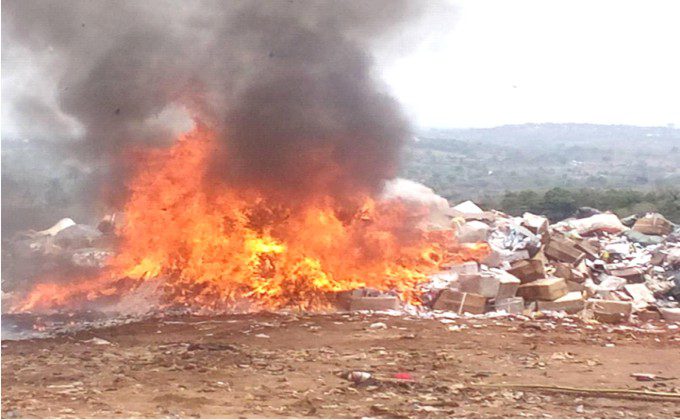The National Agency for Food and Drug Administration and Control has destroyed more than fifteen billion dollars in Ibadan, Oyo State.
Representatives from major agencies, including the Department of State Services and the Nigeria Police Force, watched the operation at the Moniya dumpsite—Federal Road Safety Ministry of Environment of Oyo State, Nigeria, and the Customs Service Corps.
Among the damaged goods were Analgin, Cocodamol, codeine syrups, tramadol, oxytocin, phonephonyy vaccinations, and other illegal products—counterfeit drugs. The agency claimed this was part of growing efforts to safeguard public health by removing dangerous items from the market.
The News Chronicle observed that this action reflects a growing concern about the supply of phony and subpar medications in Nigeria, which has long jeopardized public health and eroded trust in medical institutions.
Besides removing current hazards, destroying these products strongly shows illegal importers and fakers that enforcement is increasing by regulatory agencies.
Director of Investigation and Enforcement Martins Iluyomade presented NAFDAC Director General Prof. Mojisola Adeyeye, who disclosed that recent enforcement actions had revealed astounding examples: includinexamples, including anti-malarial medications disguised as diclofenac. Additional raids revealed illegal cosmetic plants inside Lagos military bases, highlighting the increasing complexity of manufacturers of dangerous goods.
Adeyeye also congratulated the Nigeria Customs Service for providing more than 25 containers of banned goods, examples, including tramadol, artesunate injections, codeine-based syrups, and frozen poultry, among others. Of which vanished throughout the Ibadan exercise. She emphasized that getting rid of these objects stops them from coming back to the market.
Oyo State NAFDAC Director Samuel Adeyemi underlined in his speech the agency’s zero-tolerance policy and asked the public to aggressively report suspicious drugs or merchants. He emphasized that lowering the prevalence of fraudulent and hazardous products depends on the combined vigilance of communities, medical specialists, and civil society.
By once more taking the lead, NAFDAC has reaffirmed its duty to safeguard public health and allow for more informed consumer decisions, given the damage regarding Nigeria’s battle against fake pharmaceuticals.



